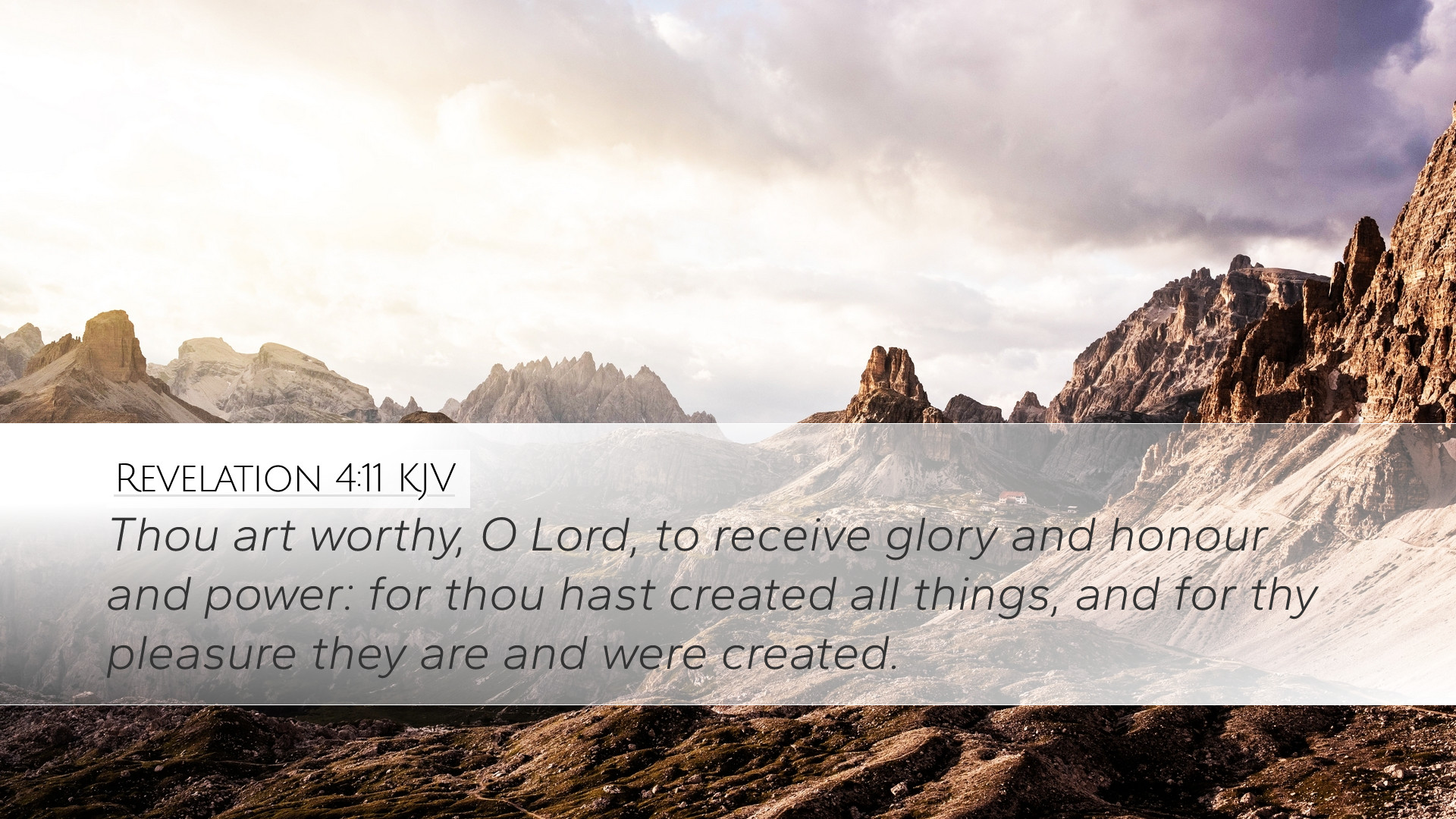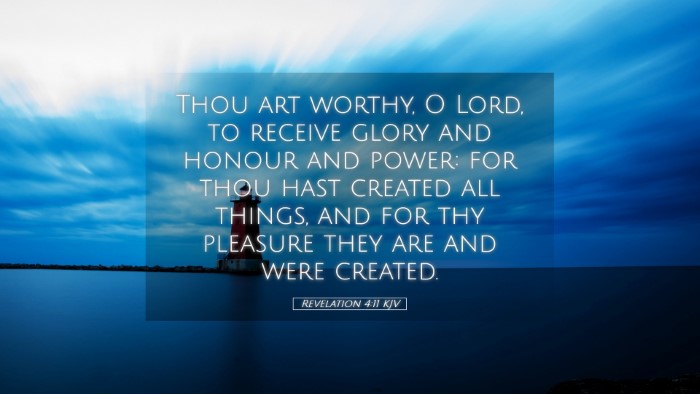Commentary on Revelation 4:11
Verse Text: "Worthy art thou, our Lord and our God, to receive glory and honor and power; for thou didst create all things, and because of thy will they existed, and were created."
Introduction
Revelation 4:11 encapsulates a sublime declaration of God's worthiness and creative power. In this verse, praise is ascribed to God for His sovereignty as the Creator of all things. This commentary will explore interpretations and insights from esteemed public domain theologians including Matthew Henry, Albert Barnes, and Adam Clarke to provide a comprehensive analysis beneficial for pastors, students, theologians, and scholars.
Insights from Commentators
Matthew Henry's Commentary
Matthew Henry emphasizes the glory and majesty of God in this passage. He notes that this verse is part of a larger heavenly scene in which the elders cast their crowns before God, symbolizing complete submission and admiration.
- The Worthiness of God: Henry states, God is worthy of all respect, reverence, and worship. Our acknowledgment of His worthiness is central to our relationship with Him.
- Creation as Evidence of Worth: The phrase “for thou didst create all things” grounds God’s worthiness in His creative acts, showcasing His sovereign power over existence itself.
- Purpose of Creation: Henry identifies the purpose behind creation—“because of thy will they existed”—indicating that everything exists according to God’s divine plan and intention.
Albert Barnes' Commentary
Albert Barnes expands on the theological implications of the verse, reflecting on the response of the twenty-four elders and the nature of their worship.
- The Nature of Worship: Barnes highlights that true worship involves acknowledging God's sovereignty and reverence for His authority. The elders' act of praising acknowledges God’s rightful place as creator.
- The Creation Account: He discusses the importance of acknowledging God's role as Creator, noting that recognition of creation brings about an understanding of humanity's role and purpose within God's creation.
- Divine Will: Barnes elaborates that creation occurred according to God’s will, reinforcing the idea that nothing exists outside of God's plan, and therefore should lead to a response of gratitude and adoration.
Adam Clarke's Commentary
Adam Clarke offers a rich historical and linguistic perspective on the verse, focusing on the terms and their implications in both the original Greek and broader biblical context.
- Language Analysis: Clarke examines the original text's words for 'worthy' (ἄξιος) and notes the insistence on God’s inherent worthiness as opposed to a worthiness earned through deeds.
- Universal Praise: He reflects on how this verse sets a foundation for universal worship, suggesting that all of creation is called to recognize its Creator, culminating in global acknowledgment of God's glory.
- Existence through Divine Will: Clarke emphasizes the phrase "because of thy will." He posits that the very existence of everything is a testimony to God’s supreme authority, encouraging believers to reflect on their significance in God's grand design.
Theological Reflections
This verse serves as a potent reminder of the theological foundation of worship. The acknowledgment of God’s majesty is not merely an aspect of traditional liturgy but is inherent in the essence of a faithful believer's life. Understanding the implications of this verse offers profound insights for preaching, teaching, and worship.
The Worth of Creation
The acknowledgment that “all things were created” carries significant weight in Christian theology, as it places God at the center of existence. This understanding challenges individuals and communities to consider their relationship to the Creator.
Response to God's Sovereignty
This verse not only defines God’s worthiness but also calls believers to a particular response—a life of reverence and worship that acknowledges God's ultimate authority over all things. It implies that every aspect of life should be viewed through the lens of God’s sovereignty and creative power.
Conclusion
In conclusion, Revelation 4:11 serves as a powerful testimony to the nature of God and His role as the Creator. By incorporating insights from renowned commentators, we gain a deeper understanding of why God is worthy of our worship and lives dedicated to Him. For pastors, students, theologians, and scholars, this passage is an invitation to engage more fully in the pursuit of knowing, loving, and serving the Creator of all things.


